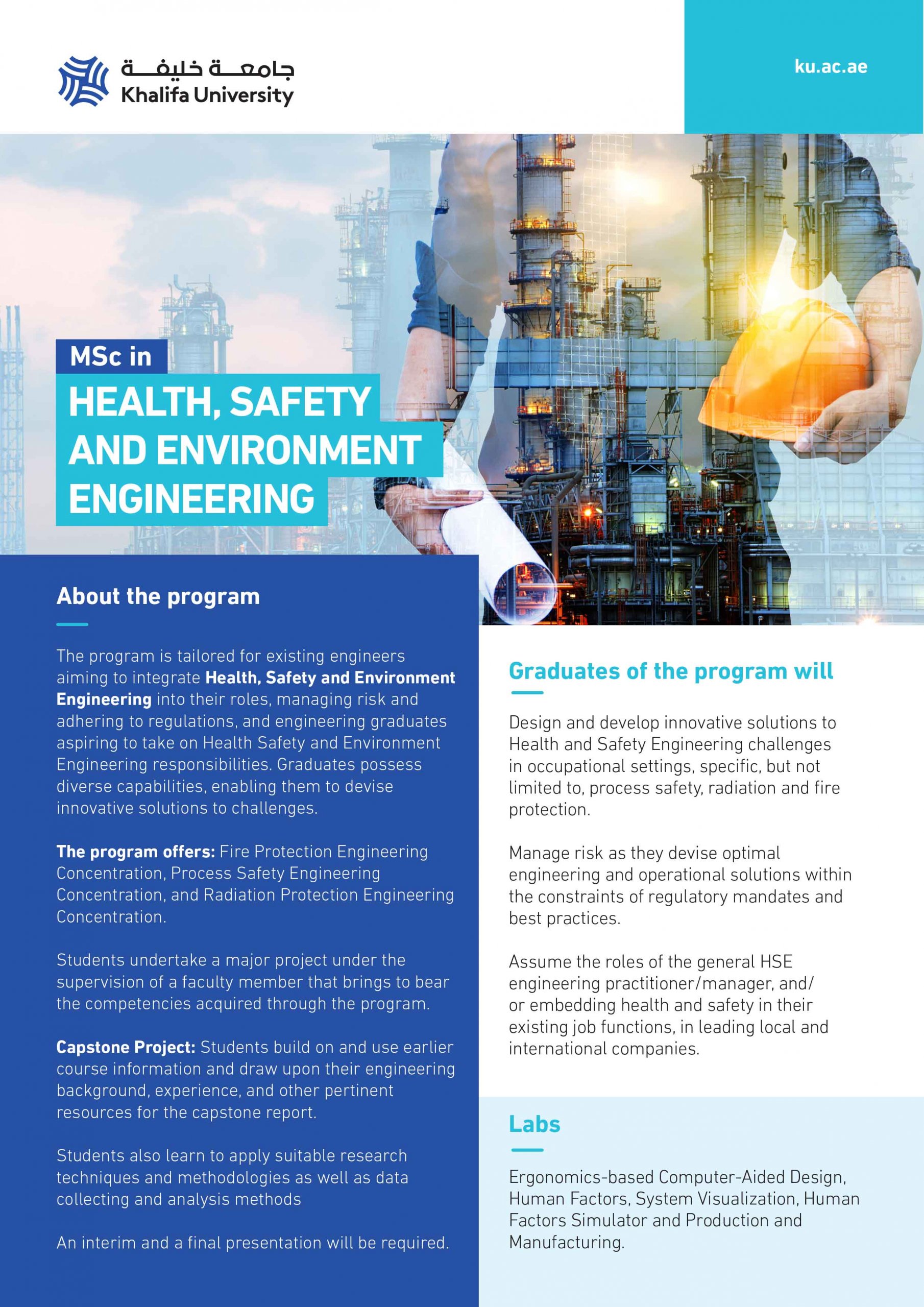OVERVIEW
OBJECTIVES
LEARNING OUTCOMES
REQUIREMENTS
STUDY PLAN
OVERVIEW
The Master of Engineering in Health, Safety and Environment Engineering degree program (MEng in HSE Engineering) is designed for the educational preparation of two types of professionals:
- Engineering graduates who are currently working as engineers in industry and who intend to stay in that type of job, but who want to embed HSE in their engineering functions. These graduates will have diverse capabilities in the various aspects of HSE and will use this knowledge to manage risk as they devise optimal engineering and operational solutions within the constraints of regulatory mandates and best practices.
- Engineering graduates who wish to assume varying levels of HSE responsibilities in one or more aspects of a company’s HSE department/program. These graduates will have sufficient background to assume the role of a general HSE engineering practitioner/ manager while possessing additional capabilities in any one of the offered HSE areas of concentrations.
Career Opportunities
The Master of Engineering in Health, Safety and Environmental Engineering (HSEG) program aims to produce graduates with the disciplinary preparation and ability to design and develop innovative solutions to Health and Safety Engineering challenges in occupational settings, specific, but not limited to, process safety, radiation and fire protection. They manage risk as they devise optimal engineering and operational solutions within the constraints of regulatory mandates and best practices. HSEG graduates are currently assuming roles of the general HSE engineering practitioner/manager, and/or embedding health and safety in their existing job functions, in leading local and international companies; including ADNOC.
OBJECTIVES
The objectives of the Master of Engineering in HSE Engineering program are to:
- Provide graduates with sufficient scientific and engineering breadth to design and develop innovative solutions to HSE problems in occupational settings.
- Provide a pool of highly educated graduates who can utilize their acquired knowledge to enhance the competitive edge of their employer.
- Provide graduates with outstanding education, management skills and knowledge to further their career aspirations.
- Provide graduates with effective communication and teamwork skills to function successfully in their careers.
- Provide graduates with a quality education committed to excellence and innovation that fosters leadership, professionalism and life-long learning.
LEARNING OUTCOMES
Upon completion of the Master of Engineering in HSE Engineering program, graduates will be able to:
- Successfully anticipate, recognize, evaluate hazardous conditions and work practices in the overall areas of HSE, hazard control in production systems, industrial hygiene, system safety, risk management, environmental, fire protection, hazardous waste, QHSE program management and ergonomics and human factors.
- Successfully develop/implement engineering and administrative control strategies for identified hazardous conditions and work practices in the overall areas of HSE, hazard control in production systems, industrial hygiene, system safety, risk management, environmental, fire protection, hazardous waste, security and emergency management, HSE program management, and human factors.
- Produce professional-quality technical summaries/reports.
- Clearly express their ideas and thoughts through professional presentations.
- Successfully function as members of teams working towards achieving solutions to defined problems.
- Develop research skills relevant to the disciplines within HSE.
REQUIREMENTS
Overall Structure and Requirements
The M. Eng. in HSE Engineering program consists of a minimum of 30 credit hours. The required program credits are distributed as follows: 12 credits of program core courses, 12 credits of program electives, 3 credits of free electives, 3 credits of HSEG graduate project (capstone course) and a seminar course in research methods of 0 credits. The table below presents a summary of the M. Eng. in HSE Engineering degree program structure and requirements.
Summary of M. Eng. in HSEG Degree Program Structure and Requirements
| Category |
Credits Required |
| Program Core |
12 |
| Program Electives |
12 |
| Seminars in Research Methods |
0 |
| HSEG Graduate Project |
3 |
| Free Elective |
3 |
| Total |
30 |
Program Requirements
Students seeking the degree of M. Eng. in HSEG must successfully complete a minimum of 30 credited hours as specified in the categories detailed in this section, with a minimum Cumulative Grade Point Average (CGPA) of 3.0.
HSEG Program Core Courses (12 credits)
The student must complete all of the courses listed below:
- HSEG 601 Introduction to HSE Engineering
- HSEG 602 Industrial Hygiene Engineering
- HSEG 605 System Safety Engineering and Risk Management
- HSEG 606 Fire Protection Engineering
- ENGR 695 Seminar in Research Methods (0 cr)
HSEG Graduate Project (3 credits)
- HSEG 697 HSEG Graduate Project (3 cr)
HSEG Program Elective Courses (12 credits)
Students must complete a minimum of 12 credits from the courses listed below, in coordination with their advisor. Alternatively, students who select one of the optional concentrations/specializations that are supported by the program must complete a minimum of 12 credits from the list of courses specified for the selected concentration/specialization.
- HSEG 604 Hazard Control in Production Systems
- HSEG 607 Industrial Security and Disaster Preparedness
- HSEG 608 QHSE Program Management
- HSEG 610 Hazardous Waste Management
- HSEG 611 Ergonomics and Human Factors Engineering
- HSEG 613 Analysis and Design of Air Pollution Control Systems
- HSEG 621/ MEEN 611 Combustion Theory and Applications
- HSEG 622/ MEEN 613 Advanced Heat Transfer
- HSEG 623/ MEEN 618 Computational Fluid Dynamics and Fire Modeling
- HSEG 624/ MEEN 619 Fire Dynamics Laboratory
- HSEG 630/ CHEG 644 Consequence Analysis of Chemical Releases
- HSEG 632/ CHEG 655 Air Quality Management
- HSEG 633/ CHEG 659 Engineering Design for Process Safety
- HSEG 641/ NUCE 606 Radiation Measurement and Applications
- HSEG 642/ NUCE 607 Principles of Radiological Protection
- HSEG 643/ NUCE 608 Radiological Protection in Planned Exposure Situations
- HSEG 644/ NUCE 609 Radiological Protection in Existing and Emergency Exposure Situations
- HSEG 645/ NUCE 615 Radiation Dosimetry
- HSEG 646/ NUCE 616 Occupational Radiological Protection
- HSEG 647/ NUCE 623 Radiological Environmental Impact Assessment
- HSEG 648/ NUCE 625 Biological Effects of the Exposure to Ionizing Radiation
- HSEG 650/ CIVE 635 Design of Civil Engineering Constructions for Fire Protection
- HSEG 694 Selected Topics in HSEG
Free Technical Elective (3 credits)
- Any course from a Master’s program in the College of Engineering.
STUDY PLAN
Students must consult with their respective advisors on the courses that they will enroll in, the required pre-requisites, and the thesis topic selection. Full-time graduate students must register for 9 to 12 credits, including thesis credits, during a regular semester (Fall and Spring) and a maximum of 6 credits during a Summer term. In the case of part-time students, the credit load is normally 6 credits during a regular semester as well as the summer term.
Students can only register for thesis credits after successfully completing a minimum of 9 credits of the core courses of the master’s program they are enrolled in. It is to be noted that the minimum pass grade for graduate courses is a “C” letter grade. Students should consult the Graduate Catalog to learn about the graduate programs, the grading system, graduation requirements, and other pertinent matters.
Study Plan
Typical study plans for full-time and part-time students enrolled in the M. Eng. in HSE program are shown below. Each student is expected to select the courses in consultation with her/his academic advisor.
| Typical Study Plan for Full-Time Students |
| |
Semester 1 |
Semester 2 |
| Year 1 |
- HSEG 601 (Core)
- HSEG 602 (Core)
- HSEG 605 (Core)
|
- HSEG 604 (Core)
- HSEG 606 (Core)
- HSEG 611 (Core)
|
| Year 2 |
- HSEG 608 (Core)
- Elective course 1
- Elective course 2
|
- Elective Course 3
- HSEG 615 (Core)
- COMM 601 (Core)
|
| Typical Study Plan for Part-Time Students |
| |
Semester 1 |
Semester 2 |
| Year 1 |
- HSEG 601 (Core)
- HSEG 602 (Core)
|
- HSEG 604 (Core)
- HSEG 606 (Core)
|
| Year 2 |
- HSEG 605 (Core)
- HSEG 608 (Core)
- COMM 601 (Core)
|
- HSEG 611 (core)
- HSEG 615 (Core)
- Elective course 1
|
| Year 3 |
- Elective course 2
- Elective course 3
|
|



